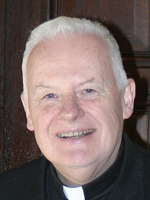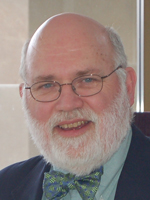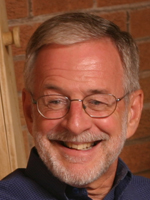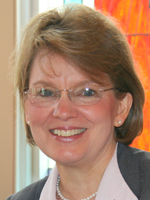Where do seminary presidents come from? To be sure, many are chosen from the ranks of the faculty. But another long tradition in theological education is the selection of presidents from outside academia. People coming from ministry positions have skills and experience that board members value.
So what are the unique gifts that nonacademics offer? What do boards see in these candidates? And what challenges do they face, coming from outside the system? To answer these questions, In Trust talked to four leaders who came to their current positions from different areas of ministry.
Msgr. James McDonald
Seminary of the Immaculate Conception
Huntington, New York
 |
| Msgr. James McDonald, rector of the Seminary of the Immaculate Conception, has a pastoral heart and a zeal for fostering new priestly vocations. (SEMINARY OF THE IMMACULATE CONCEPTION) |
After 38 years as a parish priest, Msgr. James McDonald got a call one day from his bishop asking if he would be willing to be the new rector of the Seminary of the Immaculate Conception, which is operated by the Diocese of Rockville Centre on Long Island. McDonald said he would be willing, and just a few days later he was named rector. The former rector had resigned on November 15, 2005, and McDonald's appointment was made on January 14, 2006.
Though he was surprised to be chosen for the position, McDonald approached the challenge with gusto." At 65, I welcome being able to learn new things and change directions at a moment's notice," he said.
Over the years, McDonald's career has been marked by two passions: making new converts and talking with young men about the priesthood. The latter, no doubt, was important to church leaders when considering him as rector. "I was very involved with vocation work for the Diocese of Rockville Centre for many years," he said. "I have been successful with a number of young men who later would become priests."
He knows the huge differences between the role of rector and that of a parish priest. Though a rector does not have the responsibilities of hospital visits, counseling people and catechizing of new converts, he nevertheless sees his role as "pastor to the seminary" -- a shepherd for his students, a central figure in the formation of new priests, and a mentor to the entire seminary.
His pastoral concern is most evident in his relationship with the students. In addition to giving seminars for students who are to be ordained as deacons, he also holds a rector's conference once a month. "Also, I have a policy that when I am here, the students can come into my office as late as 10:30 at night," McDonald said. "I am here almost every single night. So I talk with them regularly and know them." With about 45 students preparing for the priesthood, the task is not overwhelming.
As rector, McDonald hopes to do more in the area of recruitment, and makes it a point to "be here all summer long." He wants young people who are considering the priesthood to find him available whenever they come to campus.
McDonald leads with his primary belief: Always be a priest and always be a pastor first, he says. Be compassionate and have the interest of the larger church in mind at all times.
Dr. David Pfrimmer
Waterloo Lutheran Seminary
Waterloo, Ontario
For 20 years, Dr. David Pfrimmer served the Evangelical Lutheran Church in Canada as director of the Lutheran Office for Public Policy, focusing on social justice, public policy issues and ecumenical relations. "I felt it was a very privileged space to be in the church and a privileged way to serve the church," he said.
 |
| Waterloo Lutheran Seminary's Dr.David Pfrimmer has found that presuming to understand a school is very different from truly understanding a school. (WATERLOO LUTHERAN SEMINARY ) |
When the former principal-dean of Waterloo Lutheran Seminary announced his retirement, several trusted associates encouraged Pfrimmer to submit his name for consideration. He wasn't anxious to make a change, but his colleagues persuaded him.
No stranger to Waterloo, Pfrimmer attended the seminary as a student, served as an adjunct lecturer from time to time, and even had an office on campus at one point while working for the denomination. So during the interview process, his goal was not so much to introduce himself but, rather, to share with the board the philosophy of leadership that he would bring, so they could make an informed decision. Though he had experience teaching as an adjunct, he believes he was called more for his administrative than his academic experience.
Moving into his new role was not without its difficulties. Looking back on his experience since becoming principal-dean in May 2005, Pfrimmer noted two things that he had to think about. Institutions have a history. "It's like an iceberg," he explained. "Ninety percent isn't visible to you, but you have to try and understand it in terms of the 10 percent you can see."
Like every institution,Waterloo has its own culture. The academy is a deliberative community, he said, and as such they are naturally conservative. People coming from the outside need to recognize this history and culture in order to lead effectively.
In many ways, Pfrimmer believes his outsider perspective has been an asset in the transition. "When I looked at things, I had to really understand them," he said. "I couldn't presume to understand them. So I had to ask a lot of questions."
Fundraising was an immediate challenge, since he hadn't gained much experience in development in his previous position. Pfrimmer instituted a team approach to the management of the seminary, so many of the responsibilities of recruitment and fundraising now fall to his assistant principal.
In his role as principal-dean, Pfrimmer is trying to cultivate an approachable leadership style. "I am very accessible to the students," he said."That has not been hard -- that has been a delightful part of the task, to get to know the students, hear what they are saying and what they are thinking."
Coming up on two years as principal-dean, Pfrimmer is looking forward with an appreciation for the changes affecting the larger church." I think we are trying to be what I call a public seminary -- a community that is going to make a difference in the world."
Dr. George Murray
Columbia International University
Columbia, South Carolina
Dr. George Murray began his ministry as a missionary to Italy, where he worked as a church planter. Later he served 16 years as director of first the Bible Christian Union and then The Evangelical Alliance Mission (TEAM).
 |
| Dr. George Murray, a former missionary, had to relearn his leadership style when he became president of Columbia International University, but that doesn't mean he can't share a laugh with students. (COLUMBIA INTERNATIONAL UNIVERSITY) |
As director of the interdenominational missionary agencies, Murray had three main responsibilities: overseeing administrative operations; representing the organizations to the public; and workshops and pastoral ministry in the field.
Considering Columbia International University's tradition of training missionaries for ministry, it is no wonder the board called Dr. Murray to be their president. In fact, his predecessor had also started out as a church planter before turning to an academic career.
Murray's relationship with Columbia International University goes back to 1963, when he started his freshman year there. During his missionary career, he came back three times as a missionary in residence. In 1985, he was asked to join the board, serving for 15 years, including several years as chair of the academic programs committee.
In fact, he was on the search committee that was looking for a new president of the university. Other members of the committee had gone to the chair and submitted his name for consideration. When he realized his name was being put forward, he recused himself from the process.
Considering his background, Murray did not feel he embodied what the board was seeking in a president." I am not an academician," he said. "I am a missions practitioner" -- with a doctorate in missiology.
Nevertheless, over the next three months, the three candidates were eliminated, and the board called on Murray. They made it clear what they were looking for. They told him, "We want someone at the top beating the drum for what is the heartbeat of this school. And that's world missions," he said.
Realizing he did not have the same strengths as those who had moved up through the ranks of academia, he told the board that if they called him to lead the school, his first order of business would be to hire a provost to be the chief educational officer of the school -- a new position at the university.
Murray's transition to the new position, like all such transitions, had its learning curve. The board had asked him to focus on the external aspects of university leadership -- building the donor base, building the constituency, strengthening alumni relations.
But by the time he was installed as president, things had changed. Internal issues had arisen while the school was searching for a president, and the board asked him to make sure he did not neglect the internal issues with his external promotional ministry. So his expectations for the position were radically different than the reality. "I found out I really had two jobs, and I was happy to do that, but it is a challenge to do the internal and the external."
Murray also learned how important shared governance is in an academic institution. "Decisions at a school really need to be vetted with faculty input," he explained. "That was something I had to learn."
And he had to relearn his leadership style. "In church planting, we really did a lot of things by teamwork," he said. "I was leading a church planting team of 14 people, and we made all our decisions together." He tried to bring this style of leadership to Columbia International but found it impractical with a staff of 370 full-time employees. "I found out I needed to maintain a certain degree of professional distance from some of my colleagues in a way that I didn't have to when I was in on the ground church planting."
Murray advises anyone considering a school leadership position to do a lot of listening at the beginning. And he counsels leaders to be especially sensitive to both the faculty and the board. "Of course you have the alumni and the donors and all that is very important," he said. "But those are two key stakeholder groups that a president must not neglect."
Dr. Laura S. Mendenhall
Columbia Theological Seminary
Decatur, Georgia
When Dr. Laura Mendenhall arrived for her interview with the board of Columbia Theological Seminary as a candidate for the school's top leadership position, she did so somewhat begrudgingly. The contented pastor of Westminster Presbyterian Church in Austin, Texas, she had no real intention of pursuing the position. "I thought, I'll just go and meet them and they will know that I'm not the person they are looking for," Mendenhall explained. She didn't even want to spend the night.
 |
| Dr. Laura Mendenhall sees fundraising for Columbia Theological Seminary as inviting people to be part of God's work -- not so different, after all, from what she did week by week as a pastor. (COLUMBIA THEOLOGICAL SEMINARY) |
For ten years, she had successfully led her 760-member church. She loved her congregation, and her congregation loved their pastor. She had, however, been recommended to the board as someone they should consider, and the board was relentless in their pursuit.
During her interview, however, she discovered something about Columbia Theological Seminary that she had not expected. When she asked why they were considering her with her pastoral background, the board explained that with only one exception, Columbia had always hired pastors to lead the seminary. Mendenhall recalled that one of the board members told her, "We are going to call a pastor to be the president because this is what we do here. We make pastors so we want our president to be one."
This has not been the norm for Presbyterian seminaries in general, but it is the tradition at Columbia, and it seems the model is catching on within the Presbyterian community. Over the past several years, six presidents have been called to head Presbyterian seminaries -- all of whom were called from the pastorate.
Mendenhall has now been president of Columbia for seven years. "There was a very steep learning curve," she admits. "At the moment it seemed almost insurmountable, but in looking back now, it wasn't any harder than any other move I've made."
When she first took the position, Mendenhall looked for parallels with her pastoral experience. In the local church, the elders were her core group, her team. At first she thought the faculty was that group. The rhythm of their monthly meetings seemed familiar -- just like the session in the church. But soon she realized that she was mistaken. "My relationship with the board of trustees is more similar to my relationship with the elders on the session -- even though they meet twice a year. That took me about two years to figure out."
The board of trustees has proved to be a great help in her transition. "Working with them is very easy for me and an absolute thrill. They are the folks who give me more energy than anybody else."
Mendenhall also sees that many of her essential leadership tasks as a seminary president parallel those of the pastorate. "One of my jobs is to name reality, to see what is going on and say it out loud," she explained. "And it is also my responsibility to not give the vision but elicit the vision from them and from the Holy Spirit and then hold that vision before the community at all times."
As she looks back over the past seven years, Mendenhall recognizes several challenges she faced in her new position. One was defining her role, a role different than any other in the seminary. "I am not a faculty member and I am not a trustee," she said. And she also learned she was not called to be "pastor" of the seminary. Even though she talks regularly with students, listens and prays with them, offers counsel, Mendenhall understands it is not a pastoral position.
In spite of the learning curve, Mendenhall has become known for her successful fundraising projects, raising $40 million in the past three years -- more than has ever been raised at Columbia. Approaching the challenge with a ministry perspective has proved an asset. "I never think of what I'm doing as fundraising," Dr. Mendenhall said. "For me, what I'm doing is inviting people in to what I see God doing here so they can be part of that. It is an incredible joy to get to be part of what God is doing. I did that in the congregation every week, and so it is the very same thing."
"I have spent my life in a variety of different ways serving what I believe is Christ's ministry," she said. "For me, this is just moving to a different place to do what I have always been doing."